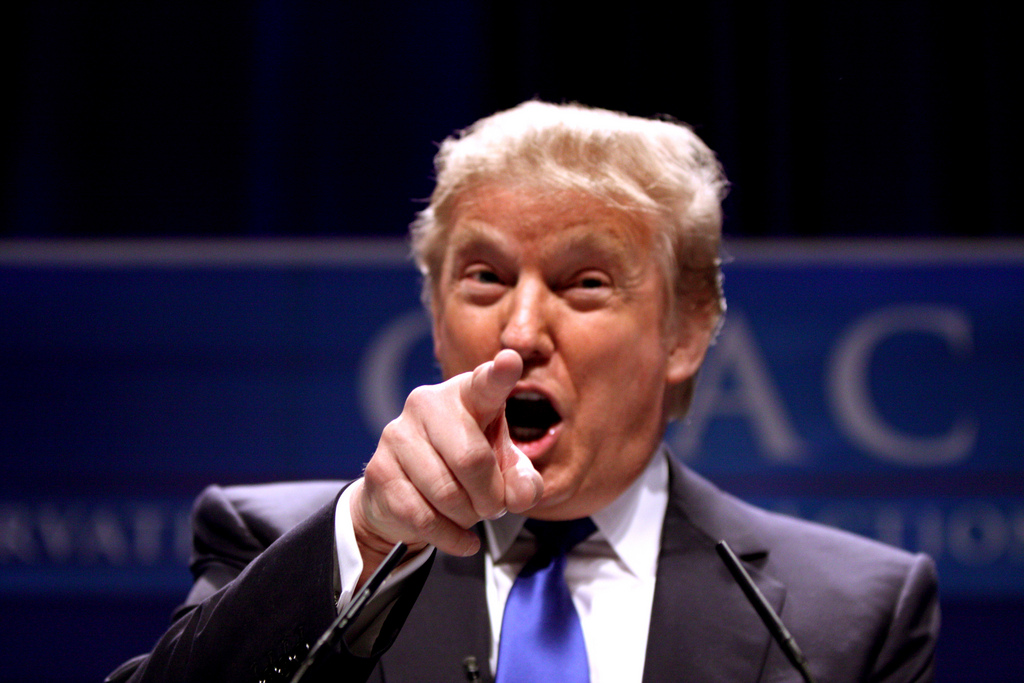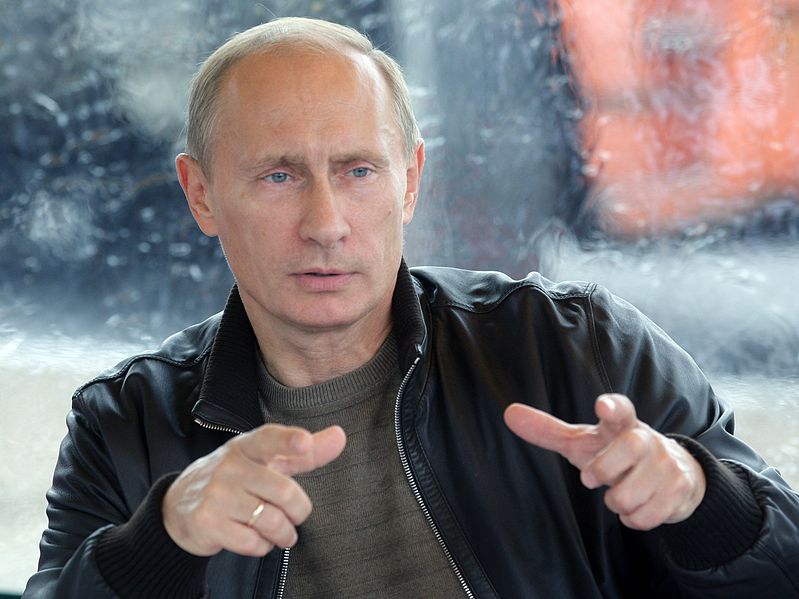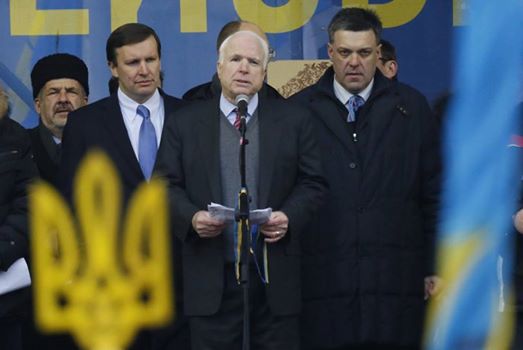Trump Confronts New McCarthyism
Gilbert DOCTOROW
The original McCarthyism of the early 1950s appeared with the consolidation of the Cold War. It was a witch hunt over supposed communist subversion of America’s democratic institutions. It was all about the Red Menace and the Russians are coming. Today’s New McCarthyism grew with the onset of a New Cold War and also has been about the Russians, especially the vilification of Vladimir Putin.
Donald Trump speaking at CPAC 2011 in Washington, D.C. (Flickr Gage Skidmore)
This anti-Russian hysteria reached a point of near absurdity in the last days of the Obama Administration with its trust-us allegations that the Russians defeated Hillary Clinton by releasing some emails showing how the Democratic National Committee sabotaged Bernie Sanders and other emails revealing what Clinton had told Wall Street banks but didn’t want the voters to know. If you noted that Clinton had previously blamed her defeat on FBI Director James Comey for reopening and re-closing the investigation into her use of a private email server, you risked being labeled a “Putin apologist” or a “Kremlin stooge.”
Of course, the anger toward anyone who resisted the “Russia-did-it” conformism did not come from nowhere. One can trace the current hostility to dissenters against U.S. foreign policy back to the presidency of George W. Bush when he gutted the Bill of Rights in promulgating the Patriot Act with almost no public challenge. In the post-9/11 climate – when any resistance to Bush’s edicts was regarded as close to treason – many of us became uneasy while talking politics on the phone or looking up certain topics on the Internet or taking books out of the library.
This intimidating surveillance did not go away when the Democrats retook the White House and Congress in the 2008 elections, but we stopped thinking about it because supposedly the “right people” now held the levers of power and surely wouldn’t repeat the abuses of Bush-43. However, not only did the surveillance state consolidate its powers under Barack Obama but the former constitutional lawyer sharply escalated the legal persecution of whistleblowers who dared give the American people a look behind the curtain.
Obama’s unprecedented assault on government transparency was compounded by the liberal-chic contempt meted out to anyone who questioned the wisdom of imposing “liberal values”, “human rights”, and “democracy promotion” on countries around the world. “Political correctness” dominated not only domestic U.S. debates but also the formulation of foreign policy.
Vladimir Putin was viewed as a retrograde force in the world, in part, because he aligned himself with Russia’s conservative social values and because he fell short of an ideal notion of what liberal democracy is supposed to be. The fact that the U.S. government also was falling far short of those standards – from ordering targeted assassinations with minimal due process to imprisoning patriotic whistleblowers – was largely ignored by an Obama Administration that saw itself as too wonderful to have flaws.
Blacklisting Dissent
So, when the U.S. confrontation with Russia over Ukraine, Crimea and the Donbas began in the summer of 2013, those of us who did not accept what was becoming the Washington Consensus, which held Putin to blame for everything, began to see ourselves as dissidents in the Soviet sense or at least in the manner of the old McCarthy era. In effect, we were blacklisted, largely excluded from publication in the professional journals, not to mention mainstream print and broadcast media. On campus, we mostly kept our mouths shut fearing for our jobs.
Russian President Vladimir Putin. (Russian government photo)
In the narrow, but politically important field of Russian studies, just how bleak the times had become was revealed in the December 2015 “Christmas issue” of Johnson’s Russia List, an important daily digest of expert and generalist writings about Russia which contained
a 40-page propaganda barrage against Putin and his ill-begotten country. But the content of that daily issue merely reflected what was entering the editor-publisher’s in-basket each day. Still, the silence of dissenters should not be confused with agreement.
For all his blustery and egotistical faults, Donald Trump has punched huge holes in the dominant neocon ideology that underlay the Washington Consensus on foreign policy during the presidencies of both George W. Bush and Barack Obama. Trump’s tweets and campaign messages asked, aloud and repeatedly, what could be wrong with the United States getting along with Russia and cooperating on common interests, starting with a joint campaign against ISIS.
Yet, Trump’s rejection of Washington’s foreign-policy orthodoxy went beyond relations with Russia; Trump was questioning the consensus on how America has conducted its role as global leader and he was challenging the arrogance of intervening in other nations’ affairs, whether by finger-waving lectures or various regime-change schemes.
As noisy and messy as Trump’s political approach has been – with a number of unnecessary diversions and self-inflicted wounds – there is a significant and “revolutionary” side of Trump’s approach. It represents a potential reordering of the two major political parties, a revamped struggle for power within the Right-Left dimension.
He restated this “revolutionary” aspect of his foreign policy in his Inaugural Address when he renounced the idea of endless interference in other countries’ politics and a return to the traditional role of America as an example, not an interventionist. This was an in-your-face condemnation of most of those sitting beside and behind him on the rostrum who favored a “values-based” foreign policy, globalization and American exceptionalism.
Taking on McCain
From the Oval Office, Trump has continued his frontal assault on this foreign-policy orthodoxy with his closely watched and disputed tweets. Much ridicule has been directed at Trump for ruling by tweets since they often reveal a lack of intellectual depth and his facile narcissism. But what they lack in refinement, Trump’s tweets make up for in feistiness and courage.
Sen. John McCain appearing with Ukrainian rightists of the Svoboda party at a pre-coup rally in Kiev
For instance, in a Jan. 30 tweet, Trump urged Republican neocon Senators John McCain and Lindsey Graham to “focus their energies on ISIS, illegal immigration and border security instead of always looking to start World War III” [emphasis mine]. This was, in its own way, as significant as the pithy and devastating rebuke issued by attorney Joseph N. Welch to Sen. Joe McCarthy on June 9, 1954, after McCarthy attacked the patriotism of a young Army lawyer: “Have you no sense of decency, sir? At long last, have you left no sense of decency?” Welch asked.
In a way, Trump’s reference to the behavior of McCain and Graham, running around the world advocating for one war after another, including a military confrontation with nuclear-armed Russia, was as precise and cutting as Welch’s putdown of McCarthy. In doing so, Trump broke the decades-long taboo on criticizing McCain despite his behavior as a loose cannon on the deck of foreign affairs, especially during the Obama years.
Behaving as if he had won rather than lost the 2008 election, McCain has traveled to such hot spots as Syria, Georgia and Ukraine with the goal of making U.S. foreign policy in the field, urging militants onward into violent clashes with their own governments or pushing U.S.-client states into conflicts with their neighbors.
Trump began his challenge to McCain during the campaign when he publicly questioned the “war hero” status of the Arizona senator by rhetorically asking in what way spending years in captivity as a Vietnam prisoner of war made McCain a war hero.
McCain took his revenge shortly before the inauguration when he informed the press that he had just handed over to the FBI for follow-up a dubious report generated by a former British intelligence agent accusing Trump of being vulnerable to Russian blackmail because of alleged cavorting with prostitutes during a visit to Moscow years ago.
To stymie any new détente with Russia, McCain also introduced a bill in the Senate calling for new and expanded sanctions against Russia. So, the White House tweet was a direct challenge to McCain for his actions that Trump warned were inviting World War III. In doing so, Trump is at least prying open space for a fuller debate about U.S. foreign policy and the wisdom of neocon interventionism.
So, notwithstanding all the self-righteous exclamations before media microphones by Establishment figures from both parties over the foibles of this populist president and notwithstanding the shouting in the streets by demonstrators, it appears that the President is advancing via his tactic of frontal attack.
A week ago, Secretary of State Rex Tillerson, Trump’s bellwether choice to oversee a new foreign policy, was confirmed by the Senate to the surprise and pleasure of those of us who had kept our fingers crossed. It is too early to say how or why Trump won this test of strength. But initial fierce opposition from ranking Republicans John McCain, Lindsey Graham and Marco Rubio was beaten back.
Now, the question is whether Tillerson and Trump’s other foreign policy appointees can achieve genuine change in the direction of U.S. foreign policy.








No comments:
Post a Comment